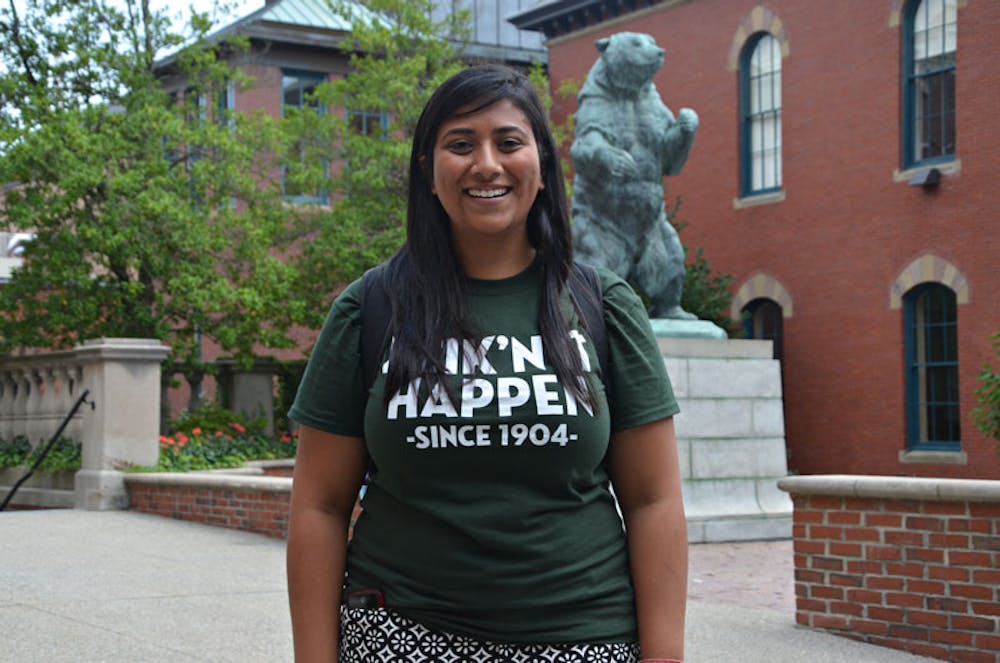The Undergraduate Council of Students will focus this year on improving sexual assault policy, mental health services and student resources such as financial aid and technology access, UCS leaders said.
Many efforts that began last spring to reform the University’s sexual assault policy will continue this semester, said UCS Vice President Sazzy Gourley ’16. A task force will oversee the sexual assault policy component of the review of the Code of Student Conduct, which is set to be revised this year.
The council will appoint four student representatives to the task force, said UCS President Maahika Srinivasan ’15.
The students’ role on the task force will be an “incredibly important one with a lot of gravity,” Srinivasan said. “We want to make sure that as an (executive) board … we really understand the complexity of what the task force is facing so that we can identify students with the qualifications that would be really well suited to that.”
The council will also work to advocate for mental health resources and support for Counseling and Psychological Services in light of CAPS’ decision to add more staff members to its eight psychotherapists, Srinivasan said. The office is currently finalizing its hiring process, she said.
Many students who were not UCS members but attended a UCS general body meeting addressing mental health last spring expressed a desire for greater demographic diversity and area specialization among CAPS staffers. “The hope was that ... (additional staff) would bring more depth to issues of diversity” in CAPS, Srinivasan said.
The council will also set its sights on aggregating and extending financial aid. Last semester, the council started a task force in conjunction with the Office of Financial Aid to ensure that the office was effectively communicating aid opportunities to students who could take advantage of these options, Gourley said. “One product to come out of that that was implemented this year is to have funding for two student liaisons who work for the Financial Aid Office to help work on how they engage with students and make more of their information accessible,” he added.
Last year’s efforts to improve online resources will continue this semester, with goals including more wireless printing and improved wireless networks, Gourley said. New initiatives will also be introduced such as a more streamlined students’ page on the University’s main website and a new UCS website.
Srinivasan, who campaigned for the UCS presidency last spring with a platform that emphasized undergraduate advising reform, also anticipates working with both Dean of the College Maud Mandel and Chair of the UCS Academics and Administrative Affairs Committee Elena Saltzman ’16 to address the issue. “We have this really incredibly golden opportunity, I think, with a new (dean of the College) to come in with a fresh slate…basically an opportunity to take three steps back and look at our advising system and see how it’s working,” Srinivasan said.
Saltzman said she intends to work to improve sophomore advising by easing the transition from first-year advisors to concentration advisors. “It felt like pre-concentration resources were kind of lacking, so something we want to make sure is that it’s a more cohesive transition for sophomores,” she said. “My team is going to work on really delving into what our advising system looks like internally — how advisors are picked, how advisors and students are matched, how each department handles advising.”
E-Soo Kim ’15, UCS Student Activities chair, said she hopes to change the student group application from a hard deadline to a rolling application to help “people who are making new groups, and groups that want to change their (funding) categories,” she said. She added that she also intends to bring back the annual leadership orientation program for new group leaders.
Walker Mills ’15, chair of the UCS Campus Life Committee and a Herald opinions columnist, said he would like to focus on student dining experiences by putting comment and suggestion boxes in the Verney-Woolley Dining Hall and the Sharpe Refectory, and then extending them to other eateries. “We’re always talking about being better in touch with the student voice, and this will generate a lot of feedback, probably both positive and negative, and give us ideas for projects,” he said.
He also anticipates negotiating with deans for proposals and funding. “A lot of it comes down to dollars and cents,” he said. “If students want more fresh vegetables and locally sourced foods … it’s going to cost money.”
The council’s technology efforts will mainly stem from the UCS Admissions and Student Services committee, said committee chair Ryan Lessing ’17. A major effort will be the creation of a subcommittee in computing and Internet technology. “There’s a lot of talent in the student body for computer science, and there’s a lot of people who want to build cool things to help people at Brown,” Lessing said. “Our hope is to serve as a facilitator, or work with students who want to build cool things … and work with CIS to make that happen.”
UCS Treasurer Malikah Williams ’16 said she will pursue her personal priority of making the council more accessible to the student body. “It’s about going out and telling people about UCS because a lot of people don’t know about it or have a negative opinion of it or don’t think we get things done,” she said.
Though he will not be involved with the council in an official capacity, former UCS President Todd Harris ’14.5 said he anticipates a productive and adaptable council. “I’m definitely going to be there to make sure that there is continuity from last year…and any advice that I can provide I’m happy to give,” he said. “I think (Srinivasan) is going to do a great job, I think this UCS is set up to keep improving and make sure that we reflect student needs more and more every year.”

ADVERTISEMENT




